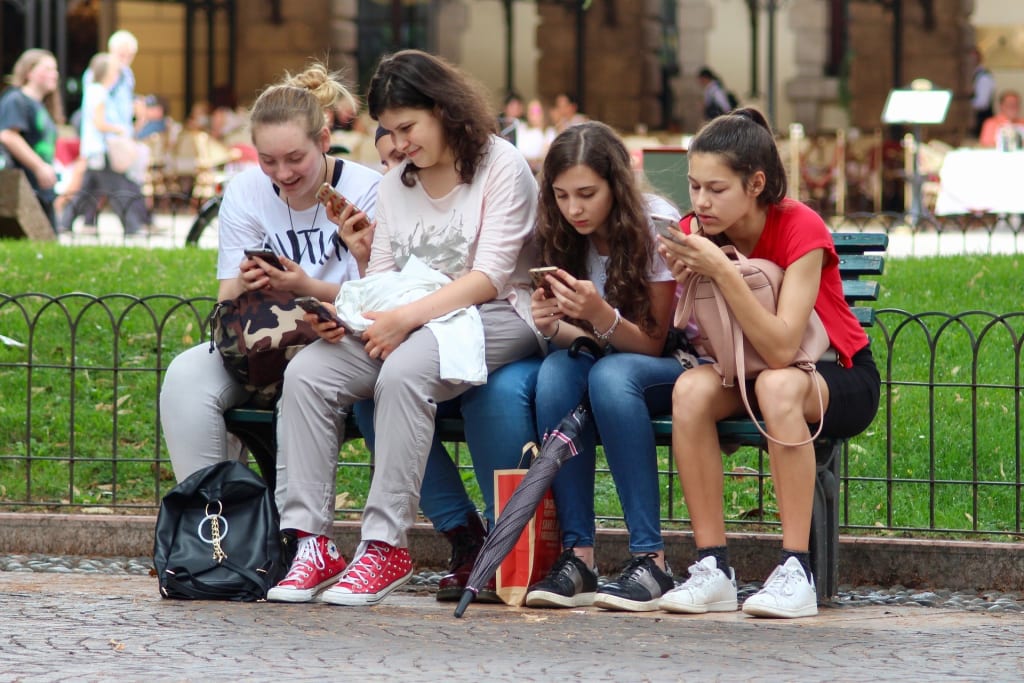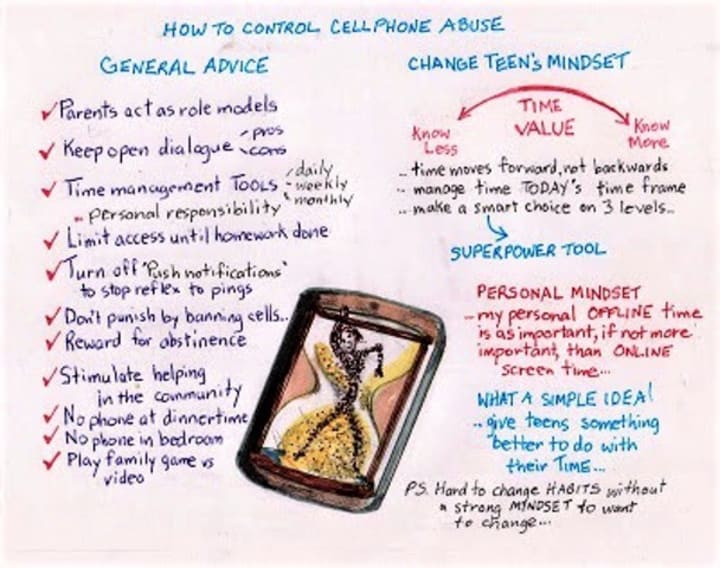How to Counter Teen Cell Phone Addiction ... 10 Steps Advice or 1 Step Personal Mindset?
“What’s at stake isn’t just how kids experience adolescence, but the constant presence of smartphones is likely to affect them well into adulthood.” Jean Twenge, psychologist.

Do you know that a new field of social media psychology has come into existence in the past 10 to 15 years to study how the consequences of social media dependence will affect our children’s future.
You may have heard the idiom cross the Rubicon with its historical reference to Julius Caesar whose army crossed the forbidden Rubicon and caused a civil war between Gaul (ancient France) and Rome. At the crossing Caesar famously said “the die is cast” meaning he know the inevitable results of moving ahead.
What if, this idiom can apply to modern day reality; but, not about winning landscapes but protecting mindscapes, especially teenagers? Most people would agree that there seems to be an undeniable battleground for many teens on social media, especially girls. Some survive this onslaught better than others, but many are victimized for a lifetime in pursuit of the popular SELFIE to be a favorite pawn of its domains within its objectives?
This situation is only two decades in the making since the internet revolution began changing our psychology and society forever. Cell phones have populated like quack grass; weedy, swampy in some places, as well as with extraordinary blooms of success. Young people, with young brains, have had to learn to adapt, adjust and survive; sink or swim in this digital virtual world, spectacle or disturbance at their fingertips, reality or virtual existence, truth or lies.
The weapons of choice are cellphones capable of many unprecedented battles: bullying in text or by phone, video-taping confrontations, problems with parents, feeling nervous about going to school, witnessing cruelty where many have joined in the harassment.
A recent report reported by ABC News and Common Sense Media (Oct 29, 2019) show a DAILY average of 7 hours and 22 minutes on their phones for entertainment purposes, not listening to music or reading a book which, if added, would jump the numbers to 9 hours and 49 minutes daily.
Would we agree that all this time watching videos and television shows, playing games and using social media adds up to an addiction for a young mind?
What is Cellphone Addiction?
Psychologist outline several familiar symptoms:
... impulsive checking the phone every few minutes ... immediate stimuli and response
... withdrawing from family or shared events to use smartphone
... disturbing sleep related to checking pings and messages
... negative emotional functioning like sadness or depression affecting school, family and friends
... increasing anxiety or irritability if phone is not available
Psychologists also realize so much of this behavior is related to the brain’s own neurochemicals’ production. Beginning research finds “ social media use can make profound changes to the brain in similar ways that drug addiction can … receiving likes on the internet releases dopamine in the brain. This creates a sense of pleasure … similar triggers include eating chocolate or winning money.”
What is Nomophobia?
However, on the other side, there is an unofficial condition called nomophobia, an abbreviation of no-mobile-phone, which causes withdrawal symptoms and releases a stress hormone called cortisol. So, with or without the phone, the brain pays its own neurochemical transmitters’ toll. Conditioning sets in, motivation heightens, addiction begins to readily program the brain to find more pleasurable rewards again and again, regardless of consequences.
Would we agree that the problem to change even a habit, much less an addiction, is difficult through will power alone?
First, you need to admit you have a problem and have reasons to change. Second, now to make changes, you have to find new activities without cell phones. Third, teenagers are expected to do this while in the middle of the digital stream, doing what everyone else is doing as acceptable.
Every battleground needs a strategy to win against the enemy; namely, the addiction problem. Here are 2 strategies:
ONE: 10 step plan with good advice to use less cellphones:
1. No phones in the bedroom … no disturbances … no debate.
2. No phones at family meals or family outings … no debate. Also set limits as adults in order to model healthy behavior.
3. Limit access to social media, games, etc. after homework is finished ... mutual agreement
4. Parents are allowed to check devices at certain times in the evening and out in the morning … mutual agreement.
5. Put your phone in “Airplane mode” to cut out constant stream of noise. Also turn off Push Notifications like texts, messages, etc. to stop reflex to check every ping.
6. Set goals with time-management tools (monthly, weekly, daily planner) to be monitored by teen … no nagging by parent
7. Keep open dialogue about pros and cons with pop star realities, many unrealistic.
8. Limit texting … call a friend and have a real conversation with your friend
9. Stimulate other positive interests in diverting attention to help the community
10. Don’t punish by taking cellphone away ... social amputation. Instead offer rewards for limiting use for certain time periods.
The bottom line is there’s no doubt that too much screen time affects teenagers’ physical actions, emotional experiences, and social relationships. Who would disagree that it is the right time to talk about both the benefits and pitfalls of screen time and how to use smartphones responsibly? Wasted time versus useful time matters to everyone.
TWO: One Step Personal Mindset
Beyond all this actionable advice, I believe that every teen girl must also create an inbuilt internal mindset that her personal time is precious, and she will choose carefully and wisely how to spend her time as her most valuable asset.
Start with a short common narrative about a young teen girl who makes serious online mistakes and discovers the value of time with redemption at the end that it is not her fault.
The story discusses elements of time and answers the question if I had a choice would I make the same choices today. She learns that the matter of making a smart choice is not “flipping a coin” but using a simple script regarding 3 levels of experience and other factors. She understand it makes good sense to use a superpower tool based on Time to make smart choices in different situations.
At the end of trials and tribulations, she looks at her open hand holding her timeline, knowing it is her responsibility. The reader can adopt her mindset or not, a common denominator that all girls can respond to and choose to take care of their personal quality time, or not; but at least, their view has widened of circumstances and consequences .
It seems a simple natural solution that the more time can be spent on celebrating a timeline, the more important it becomes.
What if, it is possible to create a strong, undeniable mindset that my OFFLINE personal time is as important, if not more important, than my ONLINE time scrolling and moiling on Social Media?
Is it possible to believe that this personal mindset might be the right solution or antidote to help counter this teen cell phone addiction?
It is certainly an idea worth checking out. Perhaps the plan is done.
Here’s a battleground road map to consider:

About the Creator
Annemarie Berukoff
Experience begets Wisdom: teacher / author 4 e-books / activist re education, family, social media, ecology re eco-fiction, cultural values. Big Picture Lessons are best ways to learn re no missing details. HelpfulMindstreamforChanges.com






Comments (1)
Dear A.B ~ I never 'Pick my Battles' without 'Idioms' - You had me at "Nomophobia" ~ Annemarie I'm not into self promotion or rewards/challenges of any kind. But, please take a moment to read "Brain Freeze" you may relate? - With Pleasure - Jay Kantor, Chatsworth, California 'Senior' Vocal Author - Vocal Author Community -